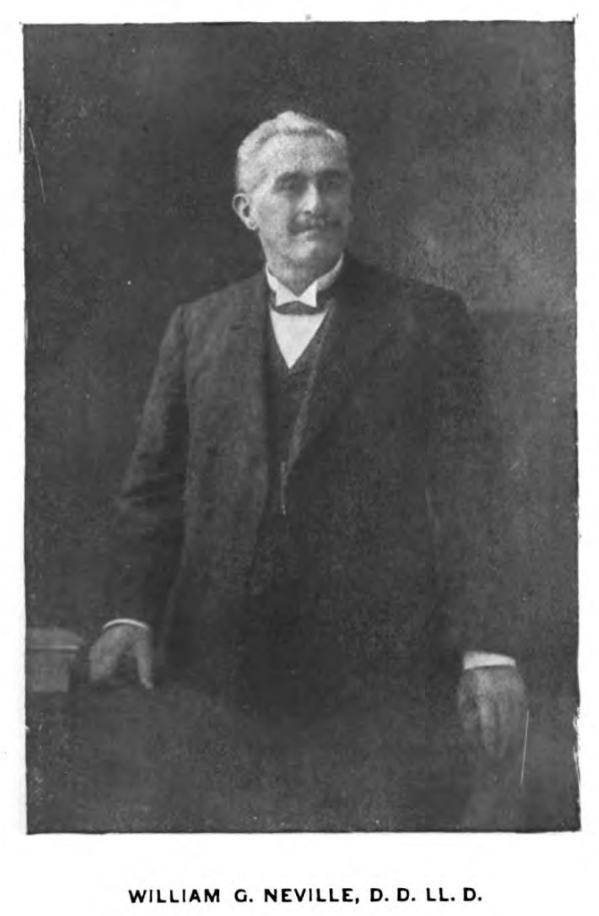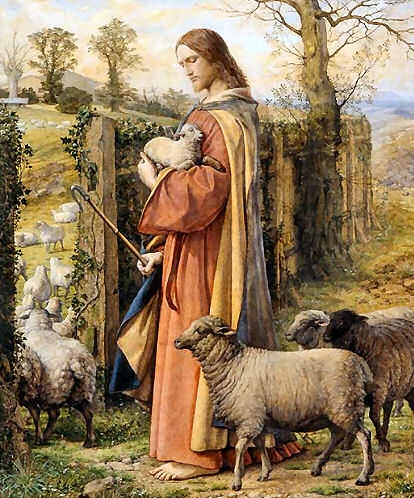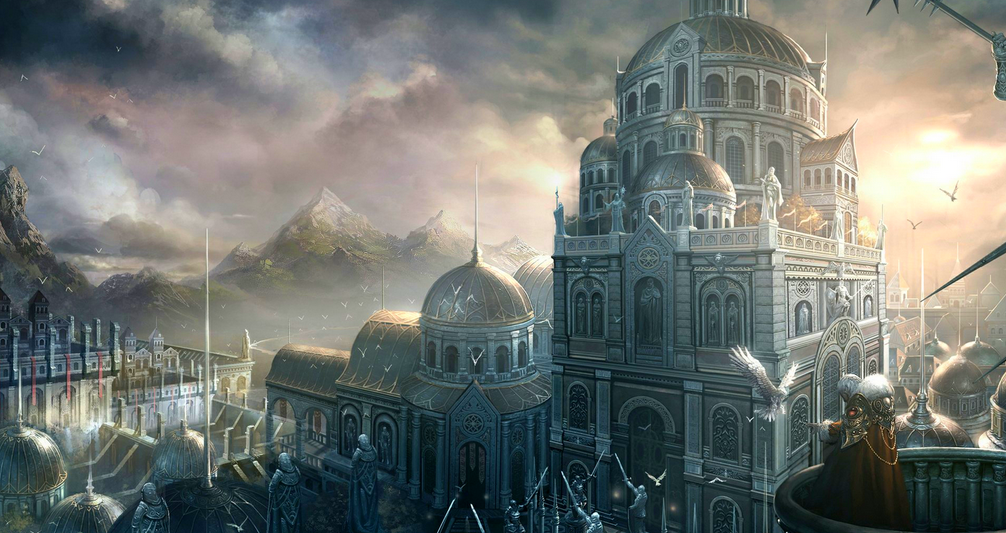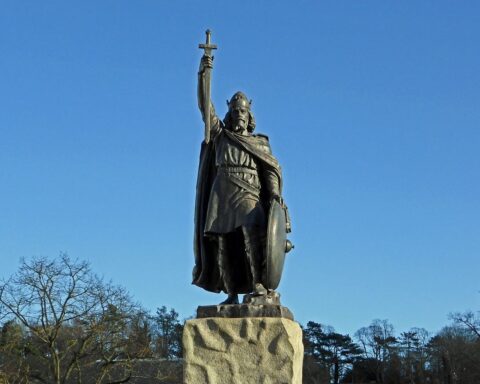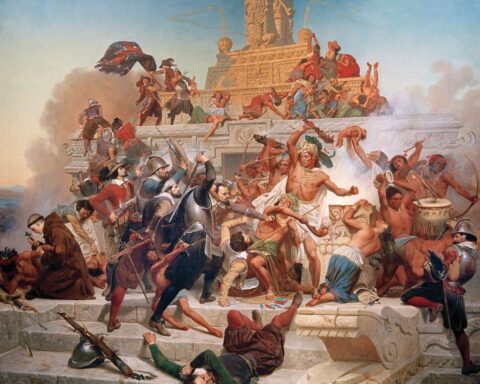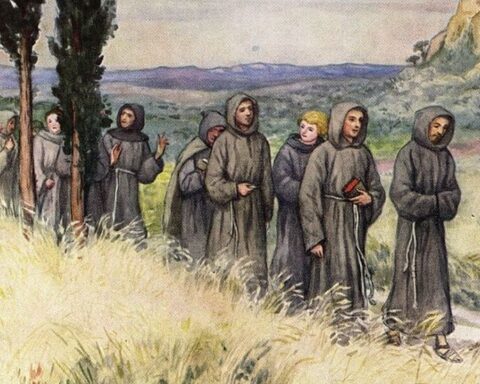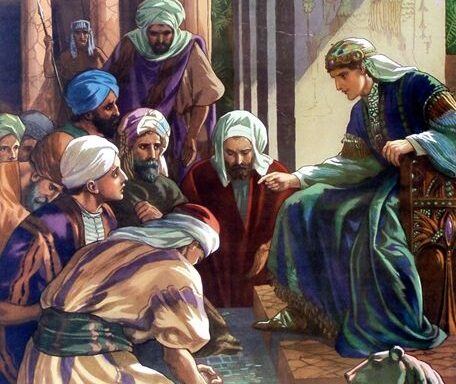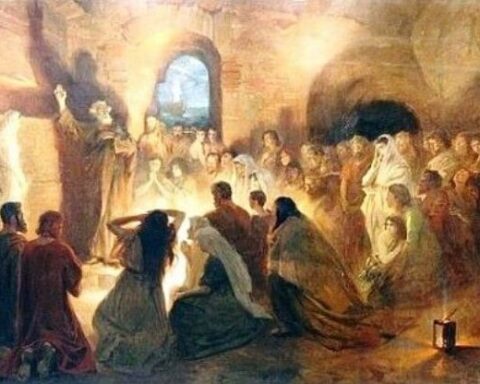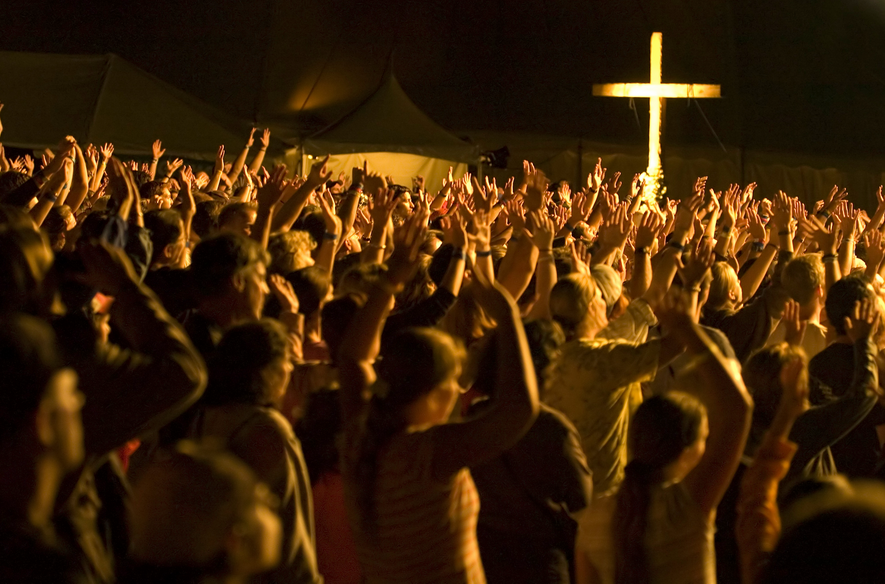
Editor’s note: The following is extracted from Sermons, by Rev. William G. Neville (published 1908).
______________________________
“We are the Lord’s.” — Romans xiv. 8.
______________________________
One of the most patent truths in all nature and history is that there is an intelligent, personal, superhuman, divine Being, manifesting Himself everywhere in nature and all along in history. In the furious storm and the terrible earthquake, we get some idea of His great power. In the delicate flower and the beautiful light which paints upon this flower all the variegated colors, we have the refinement of His feelings and the tenderness of His heart. In the mechanism of the human body and its adaptation to the surrounding world, are to be found the most wonderful manifestations of His designing wisdom and intelligence.
Then, if we will look through history, we will also see glimpses and traces of this divine Being. “A man’s heart deviseth his way: but the Lord directeth his steps.” There has not been an event in history which has not been governed and limited by this all-wise and almighty Being.
“Ten thousand ages ere the skies
Were into motion brought;
All the long years and worlds to come,
Stood present to His thought.
There’s not a sparrow nor a worm
But’s found in His decrees;
He raiseth monarchs to their thrones,
And strikes them as He please.”
This exalted Being controls nature and shapes history. The divine is all around us and in us. There is not a sprig of grass, nor a drop of water, nor a ray of light but that is akin to Deity. All things radiate from God; all things center in Him. “The earth is the Lord’s and the fullness thereof; the world and they that dwell there in.” We know by observation and history that all things do belong to God. How? By actual possession as manifested in His governing all things.
But it is not until we open the pages of Scripture that we get into the depths of the subject. Here the light breaks in upon our souls, and we see God’s right to the absolute ownership of all things. Here we see that He has authority to rule all things, and we also see the character of His administration. As Creator of all things, God is Owner of all things; as Owner of all things, He is Ruler of all things. John, in his apocalyptic vision, says: “And I heard as it were the voice of a great multitude, and as the voice of many waters, and as the voice of mighty thunderings, saying: ‘Alleluia: for the Lord God omnipotent reigneth.’ For none of us liveth to himself, and no man dieth to himself. For Whether we live, we live unto the Lord: or whether we die, we die unto the Lord; whether we live, therefore, or die, we are the Lord’s.”
We have in the text, God’s absolute ownership of us. “We are the Lord’s.” We are the property of the Lord. We belong to Him; and, therefore, He has a divine right to do with us just as He pleases.
I. Let us consider the ground of this ownership. Why are we the Lord’s? If we are the Lord’s, He must have a right to own us; and this right of possession on the part of God to us must be grounded in principles of the highest justice.
- We are the Lord’s by creation. God is the Creator; we are the created. God is eternal; our lives are as thevapor which soon passeth away. There was a time when only God existed. It pleased Him in the beginning to create out of nothing, by a simple word of His power, the heavens and the earth. God built the grand temple of the universe without any material to work upon. He created all the various parts of this magnificent temple out of nothing, and they were all drawn to their right places by a simple volition of God. He adorned and beautified this temple out of His own infinite wealth and possibilities. Last of all, He created man out of the dust of the ground, and breathed into him the breath of life, and he became a living soul, bearing the image of God. And thus it is that God creates every man. He makes the body out of the ground, and then He breathes into that body a living soul. You and I are being made every day out of the products of the ground. Every particle of matter in our bodies is dust of the earth. You see, then, we are a sort of double creation. And thus God is our double Creator, and has a double right to own us. He first made the ground, and then He made us out of the ground. God not only created us, but He created all things — the earth, with its rivers and its mountains, its fields and its forests; the heavens, with its sun, moon and stars; the light and the air, the entire universe with its vast possessions. So, you see, there is nothing that belongs to us except in a secondary sense. All things belong to God, because He created all things. When you con struct a machine, you claim it as your own, because you made it. You are entitled to that machine by every principle of justice and righteousness. How much more is God entitled to us, since He not only made us, but actually created the ground out of which we are formed!
- Again, we are the Lord’s because He preserves us. He not only gives us life, but He keeps this life a-going. It is in Him that we live and move and have our being. Were it not for God, our existence could not be continued for a moment. He feeds us and He clothes us. He shelters us from the rays of the scorching sun and the blasts of a stormy winter. Every good and perfect gift is from above. God exercises over this world not only a general providence, but also a special providence. He looks after us as individual persons, and provides for our individual wants and necessities. He preserves our lives not only by giving us those things which are necessary to perpetuate life, but also by keeping us out of danger. God is ever looking after the interests of His creatures. How do you account for the fact that children make so many narrow escapes from death, if there is not a super intending Providence preserving their lives? Ah I how difficult it would be to rear a single child, if God did not interpose in its behalf. This is a task which few of us, would undertake, and still fewer accomplish, if it were not for God’s help and direction. It is He who wards off the danger when the life of your child is threatened. God takes special care of the children. Their lives are precious in His sight. He takes them in His bosom, as it were, and nurses them, thus protecting them and pro vid1ng for them. But each one of us, it matters not how old, nor how young; it matters not how good nor how bad ; each one of us can say from the depths of the heart : “The Lord has brought me thus far in life’s journey. It is because of His will and power that I am alive to-day.” It is as God wills that man lives. Whenever God lets loose of a man’s life, then it ceases. As soon as God neglects the pulse it refuses to beat. God has not only brought us into existence, but He perpetuates our existence. He made us and not we ourselves. He preserves us, and not we ourselves. For our existence does not depend upon our own will or existence. Indeed, and in truth, can we say, “We are the Lord’s.”
- Once more I remark that we are the Lord’s by redemption. This applies only to a part of the race, to those only who have experienced or will experience in their hearts the power and blessedness of the gospel. Here we must draw a line, for God’s people are His in a very different sense from what the world is. All men belong to God, but they all do not belong to Him by redemption, because He does not redeem them all. God is not going to deal with His church, I mean the true, in visible church, as He does with the outside world. The church is His by redemption. In the plan of salvation, God gave His Son a specific work to do, which was the redemption of all God’s people. Christ says: “I must work the works of Him that sent me while it is called to-day; for the night cometh when no man can work.” And in another place He says: “All that the Father giveth me shall come to me ; and him that cometh to me I will in no wise cast out. For I came down from heaven not to do mine own will, but the will of Him that sent me. And this is the Father’s will which hath sent me, that of all which He hath given me I should lose nothing, but should raise it up again at the last day.” Christ gave Himself a ransom for the church, and thus he actually bought it. “For ye are bought with a price: therefore glorify God in your body, and in your spirit, which are God’s.” “We are the Lord’s.” He gave Himself for us, who are the church, that He might present it to Himself a glorious church, not having spot or wrinkle, or any such thing; but that it should be holy and without blemish. “Ye were not redeemed with corruptible things, as gold and silver, from your vain conversation received by tradition from your fathers ; but with the precious blood of Christ, as of a lamb without blemish and without spot: who verily was foreordained before the foundation of the world, but was manifest in these last times for you, who, by him, do believe in God, that raised him up from the dead, and gave him glory ; that your faith and hope might be in God.” The price which God paid for the redemption of His church was an infinite price, infinite in worth, infinite in dignity, and infinite in efficacy. O what strong bonds they are which unite us to the Head of the church ! In no sense can we say we are our own. We are the Lord’s ; for He hath redeemed our life from destruction. He hath lifted our feet from the mire, and set them on an eternal rock.
“His sovereign power, without our aid,
Made us of clay and formed us men;
And when, like wandering sheep, we strayed,
He brought us to His fold again.
We are His people, we His care;
Our souls and all our mortal frame;
What lasting honors shall we rear,
Almighty Maker, to Thy name!”
II. Let us consider, in the next place, the extent of this ownership. “We are the Lord’s.” All of our possessions belong to the Lord.
Our time is the Lord’s ; for it is by Him that we live. No man has the right to waste a single moment of time. Every moment that we live belongs to God, and we ought every one to give a record that will meet God’s approbation. O that men knew how to appreciate time! How are you spending the precious moments which God has given you? When you look back upon your lives, can you see where you have improved the time? Or can your history be written in these few words: Neglected opportunities and wasted moments? Your time is not your own ; it belongs to God ; and He demands something in return for every moment that you live; and I call upon each one of you to-day, to consider how you are spending God’s time. Are you spending it in His service, or in your own service, or in Satan’s service? What are you doing with that soul which God has given you ? As the moments glide swiftly by, is your soul getting any nearer to God? Are you any better than you were a year ago? The moments of the past, where are they? They are gone to the judgment seat of Christ and have rendered in their account. All that you can do, and all that I can do, cannot change a single moment in the past. Oh! what a solemn thought, that our past history is fixed, beyond the possibility of a change, as far as we are concerned. O how this ought to make us improve the present moment, for it only is ours! We cannot live a moment in the past, nor a moment in the future. God gives us but one moment at a time, and thus He would teach us the great value of every moment and the great importance of improving every moment. He gives us but one moment at a time that every moment may be improved. God will take no excuse for spiritual idleness. Do you know, my hearer, that you are writing your own history ? Every hour is a page, every day a chapter, and every year a volume! Remember, that for all these things God will bring you into judgment. Your talents also belong to the Lord. He has given each one of us a certain number of talents ; to some He has given many, to others only a few. (Matthew xxv. 14-30.) The important question with us is, not how many talents has God given us? but how are we using these talents? Are we using them for the promotion of God’s glory, or to accomplish our own selfish ends and ambitions ? Are you using the worldly possessions which God has given you as a loan for His glory? No man has a right to engage in any business which does not tend towards the promotion of God’s glory. The chief end of every man is to glorify God and to enjoy Him forever. So, if any of you are pursuing a business which is not accomplishing this end, rest assured that you have not God’s approval in the matter, and you will never receive His blessing in your work. You may prosper from a worldly point of view for a while; but, I tell you, your work will not stand the test of the future. “For other foundation can no man lay than that is laid, which is Jesus Christ.”
Again, God has given some of you children, and He is going to hold you responsible for their proper training. Do you act as if you were the Lord’s? How are you behaving toward your children? If there is anything that will bring a man to a sense of his duty, it ought to be his children. These are precious talents which God has given you. What are you doing with them? Are you allowing them to rust and mold and decay in the service of Satan ? Or are you keeping them bright in God’s service? Have you made an entire consecration of yourself to God? This is the first thing you are to do. And what good, I ask you, in the name of common sense, can you ever expect of your children until you do this? Will they not follow in your footsteps? Yea, will they not be a great deal worse than you have been ? For it is the very nature and tendency of sin to grow worse and worse. Perhaps you had some religious restraints and influence thrown around you when young; but if your children are without these, what outside of God’s almighty power will keep them from going to the utmost bounds of vice and iniquity? After you have consecrated yourselves to the Lord, you are to consecrate your children to Him. What did God require of His people in the church under the Old Testament dispensation? He explicitly required that the rite of initiation into His church should be applied to every male child when eight days old, and every one of them was to be called holy and was to be consecrated to God’s service. While the form of initiation into the church has changed, thank God, the essence remains the same. The child has just as much right in the church today as it ever did. Christ distinctly tells us that He came not to destroy, but to fulfill, and He says that not a single jot nor tittle shall pass from the law till all be fulfilled. Infant church membership was a blessing which God’s people, under the old economy, prized very highly, and did Christ, by His coming, take this blessing from His people? It is a matter of rejoicing that the Word of God does not say so. The church of God has always been the same as far as essence is concerned; and, blessed be His name, it always will be the same. For the gates of hell shall not prevail against it. God first instituted His church in the family, and I call upon you, heads of families, that you still hold up to the world the ensign of God’s church in your family, and that you never let the family die upon its altar. This church in the family is one of the most potent powers for good in the world. Family religion! That is the power which is to crush Satan’s kingdom in this world. Would you give your children to the Lord? Then, I call upon you, if you have not already done it, to organize in your family immediately a church after the apostolic order.
III. The importance of this ownership. “We are the Lord’s.” This implies that Christ is our Master, our only Master. We bow to no other. He is the sole Head of the church. The ground of this absolute sovereignty over us on the part of Christ is His death and resurrection; for the verse which immediately follows the text says: “For to this end Christ hath died, and rose, and revived, that He might be Lord both of the dead and living.” In matters of faith, we are responsible to no human being, nor to any human organization. Jesus Christ has freed the conscience. We have a divine right to our belief, and we have a divine right to publish this belief to the world. Loyalty to Christ is the greatest possible freedom. Christ has so ordered it that no human tribunal has the right to say what we shall believe. And we may rejoice that it is so; for, if it were otherwise, a great many of us would have to pay very dear for our beliefs.
In the verses preceding the text, the apostle speaks of one who believes that he may eat all things, and of an other who eateth herbs. Then he says, Let not him that eateth despise him that eateth not; and let not him which eateth not judge him that eateth: for God hath received him. For he says, “To his own master he standeth or falleth.” Again he says, “One man esteemeth one day above another: another esteemeth every day alike. Let every man be fully persuaded in his own mind.” “For none of us liveth to himself, and no man dieth himself. For whether we live, we live unto the Lord; and whether we die, we die unto the Lord : whether we live therefore or die we are the Lord’s.” Christianity condemns in the strongest terms all forms of bigotry; and he who loves his own system of belief better than the truth as found in the Word of God may rest assured that he has not the spirit of Christ. And he who loves his own denomination better than the true, invisible, elect church of God may rest assured that he is without the spirit of the Master. Of course, we must never give up devotion to truth ; but, at the same time, we want catholicity of feeling. Christ is our only Master; and let us imitate Him in His broad catholicity. Be what you are to the very core of your heart, but at the same time re member that your brother has a right to be what he is. “For to his own master he standeth or falleth.”
IV. How can we show that we are the Lord’s?
We can do this, first, by an unreserved consecration of ourselves to His service. We are to put ourselves and all that we have into His hands. In other words, we are to take God at His word. We are not to trouble our selves about the future. We are the Lord’s, and He has promised to take care of us. All of our successes and our failures are in His hands. Whether we live, or whether we die, we are the Lord’s. When we reach the point that we are willing to put our life and our death into God’s hand and let Him dispose of them as seems best in His right, then we are showing that we are the Lord’s.
But we can also show that we are the Lord’s by a life of good works. Christ says: “Ye shall know them by their fruits. Do men gather grapes of thorns, or figs of thistles?” It is simply impossible for a man to be a Christian and not do good works. If we are not living the gospel, all of our professions will amount to nothing.
It is the life that tells what a man is; for it is nothing but a public exhibition of the heart and character. How are you living? What are you doing? Where are your fruits? Are there any here to-day of whom the Master shall say at the last great day, nothing but leaves? Oh! my hearers, work while it is called to-day, for the night cometh when no man can work.
“Lord, I am Thine, entirely Thine;
Purchased and saved by blood divine;
With full consent. Thine I would be,
And own Thy sovereign right in me.
Thine would I live;
Thine would I die,
Be Thine through all eternity;
The vow is past beyond repeal;
Now will I set the solemn seal:
Here at that cross, where flows the blood,
That bought my guilty soul for God;
Thee, my new Master, now I call,
And consecrate to Thee my all.”
